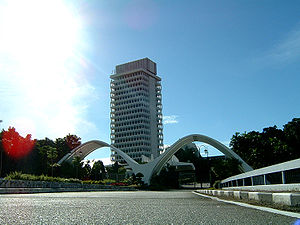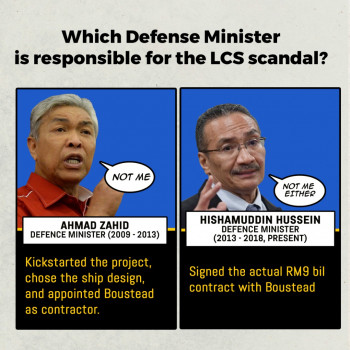by Ivy Kwek
 The government is asking for money, again. This time, it’s a whopping 13billion. Some might wonder about the timing of the request, since the budget is normally tabled in October every year. Yes, this is the supplementary Supply Bill where the government asks for more money to spend for the year. This is to say, the 13 billion it is asking for is in addition to the already gigantic-sized annual budget of 168 billion for 2011.
The government is asking for money, again. This time, it’s a whopping 13billion. Some might wonder about the timing of the request, since the budget is normally tabled in October every year. Yes, this is the supplementary Supply Bill where the government asks for more money to spend for the year. This is to say, the 13 billion it is asking for is in addition to the already gigantic-sized annual budget of 168 billion for 2011.
For the government to ask for monetary supply from parliament is nothing new. In the last ten years, the government has tabled supplementary supply bills at least twice a year (see table). The additional budget in 2007 amounted to 27.3billion. On top of that, every time a supplementary supply bill is tabled, it will be given priority to be debated before the other ongoing bills being debated, cutting the queue to be the first in line. The period of debate for the supplementary supply bill is not long, usually it would take only one or two days.
Since the BN Member of Parliaments command the majority, the supply bill will almost certainly be passed when put to vote. In other words, the government can make ‘cash withdrawal’ from the people anytime.
| Year | Annual budget | First Supplementary Supply Bill | Second Supplementary Supply Bill | Third Supplementary Supply Bill | Total Supplementary Supply | Total Expenditure |
| 2011 | 162,805,323,000 | 13,186,713,000 | Yet to be tabled | – | 13,186,713,000 | 175,992,036,000 |
| 2010 | 108,688,613,000 | 9,246,814,800 | 13,170,997,600 | – | 22,417,812,400 | 131,106,425,400 |
| 2009 | 129,961,382,300 | 11,132,219,926 | 6,473,804,960 | – | 17,606,024,886 | 147,567,407,186 |
| 2008 | 105,575,140,000 | 20,153,679,997 | 5,000,000,000 | – | 25,153,679,997 | 130,728,819,997 |
| 2007 | 91,225,189,000 | 9,786,743,510 | 17,545,171,800 | – | 27,331,915,310 | 118,557,104,310 |
| 2006 | 81,120,057,730 | 4,127,483,443 | 19,081,912,893 | – | 23,209,396,336 | 104,329,454,066 |
| 2005 | 68,676,281,000 | 9,102,269,992 | 10,152,874,593 | – | 19,255,144,585 | 87,931,425,585 |
| 2004 | 62,204,042,800 | 6,681,673,350 | 9,738,708,055 | – | 16,420,381,405 | 78,624,424,205 |
| 2003 | 55,386,244,850 | 1,500,000,000 | 18,988,403,497 | – | 20,488,403,497 | 75,874,648,347 |
| 2002 | 49,908,772,520 | 1,403,342,710 | 315,803,830 | 16,108,293,103 | 17,827,439,643 | 67,736,212,163 |
| 2001 | 44,939,410,180 | 130,622,700 | 1,537,800,000 | 16,782,256,703 | 18,450,679,403 | 63,390,089,583 |
13 billion is not a small amount. For most of us, we might not own even one billion in our lifetime! Perhaps this is why many of us do not realize that this 13 billion is the collective hard-earned money of all tax-paying Malaysians.
How is the money spent? The official documents usually categorize government spending as emolument, renovation or introduction of new policy. Yet recent revelations raised doubts on actual government spending.
The 1Malaysia email fiasco several months ago was a good example – with the availability of Google, Yahoo and other free email service, why does the government choose the redundant step of paying for expensive email accounts?
Although the government stressed that the project is ‘private sector driven’, can’t the money be put into better use, such as improving the internet connectivity in rural areas? The government also concealed the fact that government agencies using the 1Malaysia email service provider will later be required to pay RM0.50 per email to Tricubes the service provider.
After whining about lack of funds, the government slashed subsidies and increased oil prices to feed its ballooning expenditure. Yet it still spent money to send festive wishes via SMS to the whole nation during festivals.
While the people are saddled with higher electricity tariffs to rescue the troubled Tenaga Nasional Berhad, the Independent Power Producers can still enjoy their profits by selling electricity back to TNB at a higher price. At the moment, the government has yet to declassify TNB’s contracts with the IPPs.
More recently, the Tourism Ministry of Malaysia after the questioning by DAP’s Anthony Loke revealed that RM1.8 million was spent to set up six Facebook pages for the ministry. This provoked widespread public anger, as it does not take an IT expert to know that Facebook accounts are free.
Netizens who set up a Facebook protest page provocatively named ‘Curi-Curi Wang Malaysia’ have demanded that the government explain the expenditure and that the minister Ng Yen Yen step down. The citizen’s initiative page garnered more fans in a single day than the 1.8million-worth Tourism Malaysia official Facebook page mustered during its entire campaign duration. Even the usually politically indifferent youths couldn’t hold their cool and have spoken up to express their disgust at the waste of public funds.
These examples are but the tip of an iceberg. BN‘s spendthrift splurging is clear as day. Are the leaders blind to their subordinates follies, or did they condone those acts? Are they uninformed that life is hard for the common Malaysian, or are they indifferent to our struggles?
It is understandable that the government needs money to operate; it is also acceptable if the money is used for beneficial policies. But while the Barisan Nasional asks for money from the people, do they do their part well and walk their own talk of ‘People First, Performance Now’? The wise voters can judge for themselves. – The Rocket



